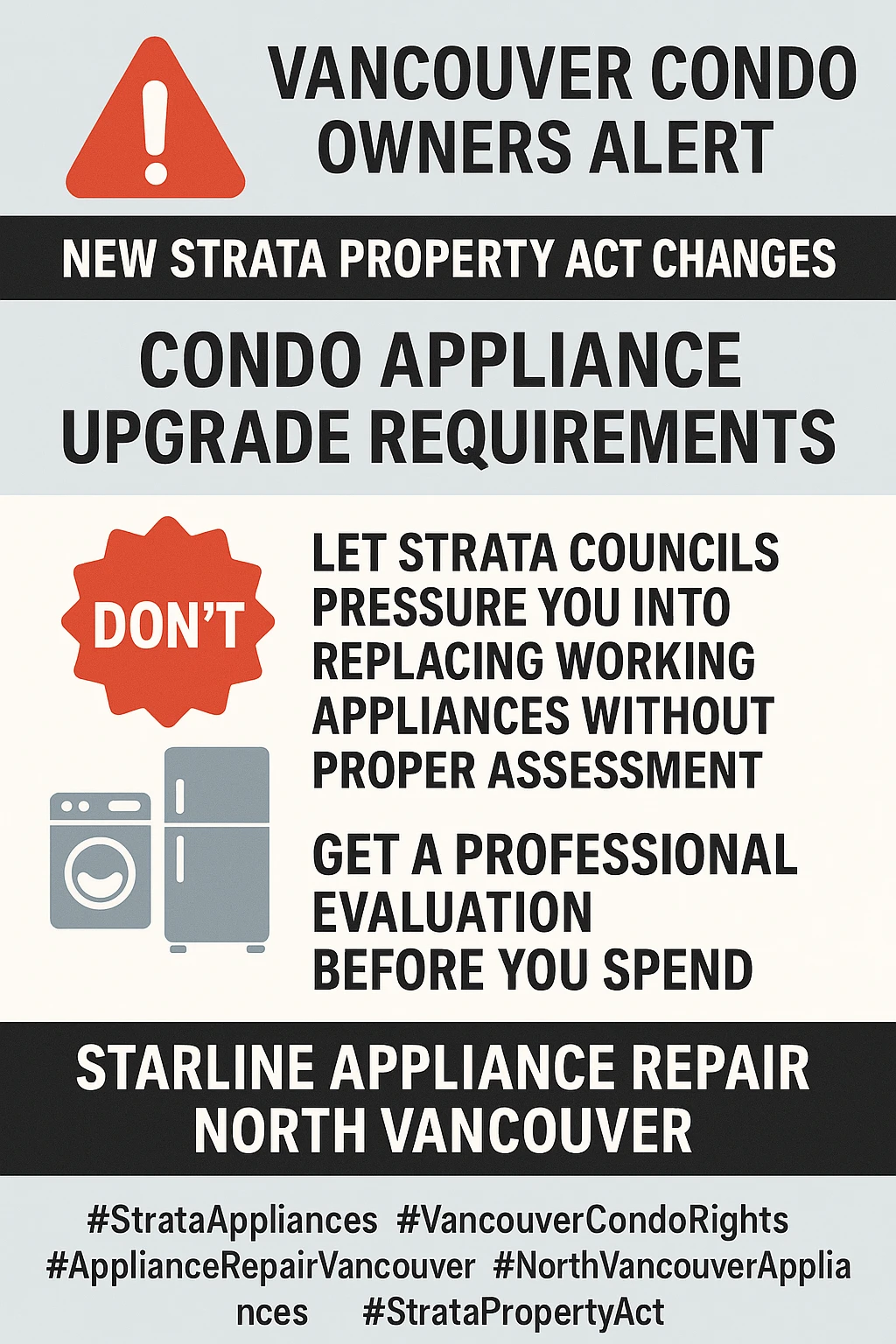Dealing with strata council pressure to replace working appliances in your Vancouver condo? Understanding the intersection of Vancouver’s new legislative changes, coastal climate impacts, and your rights as a condo owner can help you distinguish between necessary maintenance and discretionary upgrades that could cost thousands unnecessarily. Vancouver’s coastal environment and evolving strata property regulations create a unique challenge for condo owners navigating appliance replacement decisions. Recent changes to British Columbia’s Strata Property Act, including mandatory depreciation reporting and increased contingency reserve fund requirements, have empowered strata councils with new tools for planning capital expenditures. Meanwhile, Vancouver’s marine climate reduces appliance lifespans by 20-30% compared to inland properties, creating legitimate maintenance pressures that affect timing decisions around repair versus replacement. The complexity arises when strata councils recommend replacing appliances that still function adequately, citing depreciation report recommendations or building standardization initiatives. Owners face difficult decisions about whether to accept these recommendations, challenge them through professional assessment, or seek dispute resolution when they believe council actions exceed reasonable maintenance requirements. Understanding your rights under BC law, the environmental factors affecting appliances in Vancouver’s coastal climate, and the professional standards governing repair-versus-replace decisions becomes essential for protecting your financial interests while maintaining compliance with legitimate strata obligations.
Key Outtakes:
- Vancouver’s coastal climate reduces appliance lifespan by 20-30%, requiring more frequent maintenance and earlier replacement than inland properties
- New BC legislation mandates depreciation reports every five years and minimum 10% contingency reserve contributions, formalizing strata planning for major capital projects
- The 50% repair rule provides a framework for replacement decisions, but Vancouver’s high service costs and environmental factors require careful application
- Strata corporations must repair common property and original fixtures, but cannot unreasonably mandate discretionary upgrades disguised as necessary maintenance
- Professional assessment by independent experts can distinguish legitimate replacement needs from unnecessary capital expenditures, potentially saving thousands

Understanding BC’s Evolving Strata Property Legislation

British Columbia’s Strata Property Act has undergone significant modernization that directly impacts how strata corporations approach appliance maintenance and replacement decisions. The legislative changes create new frameworks that affect both strata council authority and individual owner rights when facing appliance replacement recommendations. Effective July 1, 2024, the Province eliminated the previous allowance for strata corporations to defer depreciation reports through annual votes, implementing mandatory five-year reporting cycles for all strata corporations with five or more lots. This change represents a fundamental shift toward proactive planning for building system maintenance, including appliances classified as common assets or original fixtures. The depreciation report, prepared by qualified professionals, provides detailed assessments of anticipated repair and replacement needs, projected costs, and recommended timelines for capital expenditures. Complementing these reporting requirements, minimum contingency reserve fund contributions became mandatory on November 1, 2023, requiring strata corporations to contribute at least 10% of their annual operating budget to reserves. This mandatory contribution level ensures adequate funding accumulates for depreciation report recommendations, including appliance replacement initiatives that previously might have required special levy assessments against owners. The practical effect creates an environment where strata corporations now have formal mechanisms requiring them to identify specific appliances needing replacement, project costs with professional guidance, and maintain funding to implement these projects. However, these new authorities also come with obligations for strata councils to act reasonably and distinguish between necessary maintenance expenditures and discretionary upgrades that exceed their mandate. Additional legislative modifications have streamlined spending authorization from contingency reserves for capital projects. Previously, contingency reserve expenditures required three-quarter vote thresholds that made emergency repairs and planned projects subject to contentious owner meetings. Current legislation allows majority votes for repairs specifically recommended by depreciation reports, empowering strata councils with administrative flexibility to implement professional recommendations without requiring unanimous owner support. These regulatory changes create potential friction points between strata councils seeking to comply with professional recommendations and individual owners questioning whether specific replacements represent necessary maintenance or discretionary improvements. Understanding this regulatory framework helps owners evaluate whether strata council recommendations align with legislative requirements and professional standards, or whether they exceed reasonable maintenance obligations.
Vancouver’s Coastal Climate Impact on Appliance Longevity

Vancouver’s marine environment creates distinctly challenging conditions for household appliances that distinguish this market from inland Canadian cities and most North American locations where manufacturers establish design specifications and lifespan estimates. The combination of high humidity, salt air penetration, temperature fluctuations, and persistent moisture exposure collectively reduces expected appliance service life significantly below manufacturer specifications. Salt air represents a particularly aggressive environmental factor that extends much further inland than most residents realize. During coastal storms and high wind events, salt particles travel up to 25 kilometers from the ocean, carried by prevailing weather patterns that deposit corrosive elements on appliance components throughout the Greater Vancouver area. These salt deposits initiate accelerated corrosion processes affecting refrigerator coils, washing machine drums, dryer components, and ventilation system internals. The corrosive effects manifest in appliances as young as five years old, well before manufacturer warranty periods expire. Professional repair technicians report observing salt-related damage in high-rise applications where ventilation systems draw ocean-influenced air directly into building mechanical systems. A refrigerator in Kitsilano or washing machine in Vancouver’s West End encounters substantially different environmental stresses than identical equipment in Calgary or Kelowna, explaining why effective maintenance strategies require adaptation to local conditions. Humidity presents the second major environmental challenge, with indoor relative humidity frequently climbing above 60% during Vancouver’s extended rainy season from October through April. Most appliances undergo manufacturing testing and engineering design based on 30-50% humidity ranges, making Vancouver’s moisture levels a significant stressor that penetrates internal mechanisms where it promotes electrical component corrosion, encourages mold growth in sealed spaces, and creates conditions for control board failures. Washing machines and dryers face particular challenges from elevated humidity conditions, as their normal moisture management functions combine with environmental humidity to create ideal conditions for bearing failures, seal deterioration, and internal corrosion. Professional technicians report these failure patterns as increasingly common in Vancouver’s market compared to drier inland locations. The freeze-thaw cycling Vancouver experiences, while moderate compared to prairie winters, creates thermal stress through repeated expansion and contraction cycles affecting rubber gaskets, plastic components, sealants, and electronic control systems. This thermal cycling differs substantially from consistent extreme cold or stable temperatures, causing materials to crack, connections to loosen, and components to fatigue prematurely in ways that distinguish Vancouver’s appliance performance patterns from other Canadian markets. These environmental realities mean standard manufacturer specifications citing 10-15 years for refrigerators, 9-12 years for washing machines, or 8-10 years for dishwashers require downward adjustment when applied to Vancouver properties. Professional assessors preparing depreciation reports should account for these environmental factors when evaluating appliance condition and replacement timing, and individual owners can use this environmental context to evaluate whether strata replacement recommendations reflect reasonable professional judgment.
The 50% Repair Rule in Vancouver’s Market Context

The appliance repair industry widely applies the “50% rule” as a standard framework for repair-versus-replace decisions: if repair costs exceed 50% of replacement cost, replacement typically represents the more economical choice. While this provides useful general guidance, applying it effectively in Vancouver’s market requires understanding several important local factors and limitations. Vancouver’s expensive real estate market drives appliance replacement costs substantially higher than national averages. Basic refrigerators typically start at $1,200 and upward, with washing machines beginning around $800 for entry-level models. Service call fees range from $120 to $230, often applied toward repair costs if owners proceed with service. Major repairs involving compressors, motors, or control boards can range from $300 to $1,500 depending on appliance type and specific requirements. When applying the 50% rule to these Vancouver price points, a $600-700 repair on a refrigerator with $1,500 replacement cost pushes the decision toward replacement, even though the same repair might represent reasonable maintenance in lower-cost markets. This means Vancouver owners face replacement pressure at lower absolute repair costs than owners in other regions, making professional assessment of repair necessity particularly valuable. Age and remaining serviceable life represent critical considerations often overlooked in simple 50% rule applications. If an appliance approaches 12-14 years old in Vancouver’s accelerated aging environment, repairing it may represent poor financial stewardship because replacement becomes inevitable within 1-2 years anyway. Conversely, if an appliance is relatively young—5-7 years in Vancouver’s coastal climate—repair may justify costs slightly exceeding 50% because the
